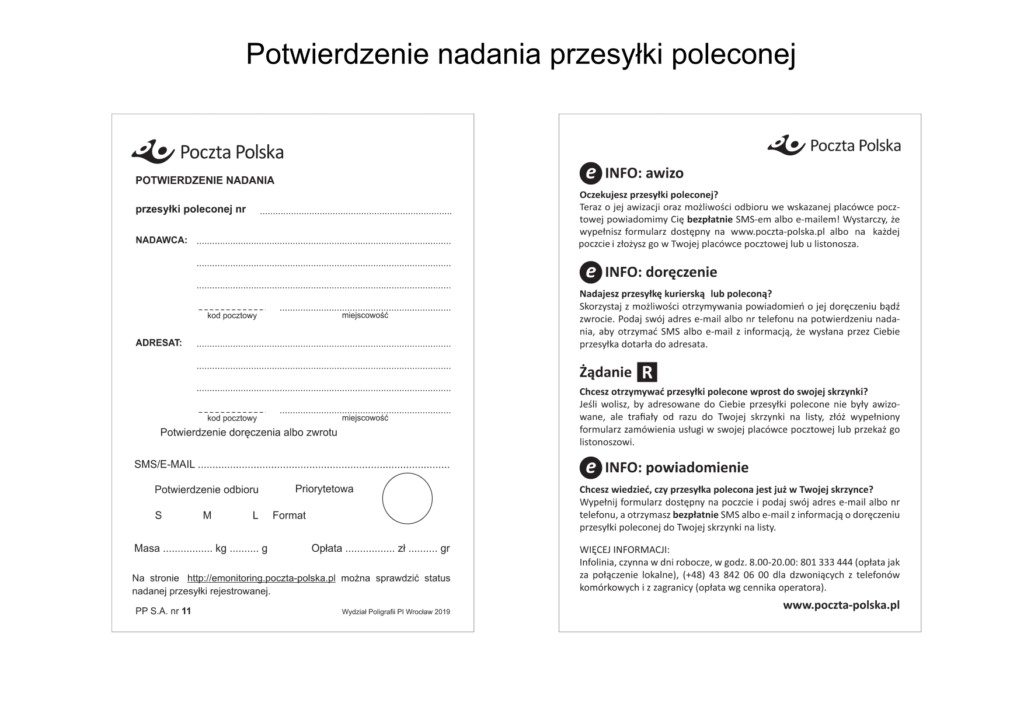Polish bureaucracy is not the best in the world, but not the worst either. Depending on where you are from, you may find it quite tolerable or completely disorganized.
Still, there are some advices we can share with you, that may help you get through administrative process.
1. Always bring two copies of any application or document you file and ask for a confirmation.
Any administrative institution have it’s own mess. If you want to have any confirmation of documents you filed there – ask for it. The clerk has an obligation to give it to you on your request.
Also, unless you provide them with a copy of a document, you will most likely only get a small piece of paper with a stamp that won’t prove in any way what kind of document you have filed. Therefore, it is best to bring a copy of any document and ask a clerk to give you a confirmation on this document (with a stamp AND signature). This will help you in case an office will lose your documents/attachments, as well as help you keep track of what you gave them.
2. Know the number of your case. It may provide you valuable information.
The number of your case is not just the office’s serial number. It will help you when asking about your case or when performing any actions related to it. It is also a good source of information. Let me show you an example from Urząd Wojewódzki:
SOC-LPII.1234.1.3073.2018.JK
SOC – designation office’s department (in this case Wydział Spraw Obywatelskich i Cudzoziemców)
LPII – number of the above department (in this case – 2nd)
2018 – a year an office has started a proceeding (a moment they performed a first action and granted a case number)
JK – these are initials of the clerk that is working on your case directly (e.g. “Jan Kowalski”). It oftentimes possible to track down this person using information published on the office’s website.
3. Don’t leave anything until the last minute. Time does matter.
If an office is asking you to bring some additional information or documents within a given time (e.g. 7 days) or until certain date (e.g. until 16.12.2020), start working on it as soon as you can. If you leave it on the last day, you may not prepare everything in time. Also, these deadlines are very important. If you have 7 days and you bring the documents after 8 days, then you may get a negative decision.
4. Be polite. Everything depends on people.
Polish administrative procedure is governed mostly by so called “discretion” (“uznaniowość”). It’s a legal term, which means that in many parts of administrative process, a clerk working on your case is free to decide how to resolve it (to a certain degree). That’s for better or worse. So remember to always be polite to others, if only for them to answer you in kind.
5. Always use an up-to-date application form.
There is a number of errors you may make while filling in any forms required by Polish offices. The cardinal error is using an outdated form found on a random website. Since these forms are changing quite often (these changes may be very subtle and hard to spot), it is always better to use only those found on the website of the office where you file your application.
6. If you send anything by post, use ONLY registered mail (list polecony).
By default, any application, form or document can be filed by Polish post. Keep that in mind in case you won’t have time to stay in long lines at the office, it will be closed for holidays or they will require you to get any impossible-to-get appointments.
Still, it is imperative to always send it by registered mail (list polecony). It’s a mail that is confirmed by mailing receipt (potwierdzenie nadania) – a document, that looks like this:

Never use unregistered mail (list zwykły), when dealing with any administrative case. Not only you won’t get any confirmation that you send your letter, but also there is a risk, that it won’t reach the office at all.
Of course you should always keep these mailing receipt safe. If you lose it, you won’t be able to get a new one.
7. Follow any requests from offices exactly.
Once in a while you may receive a letter from the office, asking you to bring some documents, that in your opinion has already been provided. Or to fill in an application you have already filled.
This can be annoying and may seem pointless, so you may feel a temptation to do things your way (e.g. not bring them documents you think they already have or provide something else then what they request). Still, remember that administrative procedure is a formal one. If you don’t provide the exact documents or information they want, you may receive a negative decision. So it should always be in your best interest to always follow any request to the letter.
8. You don’t have to do everything personally. Know who can help you.
Dealing with any kind of legal proceeding may be a difficult, time consuming and stressful task. This is why you may ask for professional assistance. In any legal matter it is possible to be represented by an attorney that will deal with preparing an application, as well as any further letters or requests from the office.
Should you decide to use some help, know that there are many types of lawyers in Poland with different qualifications:
| Title of an attorney | Minimum qualifications |
| radca prawny (attorney-at-law) | – Master degree in law (5 years) – Legal application (3 years/720h of classes/9 exams) – State exam for attorney-at-law |
| adwokat (advocate) | – Master degree in law (5 years) – Legal application (3 years/420h of classes/2 exams) – State exam for advocate) |
| prawnik/law specialist/legal advisor (lawyer/specjalista prawa/doradca prawny) | None – anyone can use these titles without any education. |
9. The proceeding can’t take forever. And you can do something about it.
It is no news, that many proceedings take very long. What you should know, is that any Polish proceeding has a deadline stated by law. The general rule is 1 month for any matter that requires evidentiary process and 2 months for especially complex cases (although some matters may have different deadlines – for example temporary residence permit application should take no longer then 6o days). If the office is handling your case for too long, then you may start a complaint procedure. This way you may speed up your case, as well as receive a compensation for long waiting period.
You can learn more about it here.
10. Negative decision doesn’t mean your case is lost.
So you received a negative decision and you feel like everything is lost. Well, not quite.
Every administrative proceeding in Poland has two stages (instances). It means that you can appeal from any legal decision to the superior office. And even after this second stage (instance), you may file a complaint to Polish administrative court to challenge it’s result.
So, if you don’t agree with the office’s decision, you can always make an appeal and change it for the better. Your chances depend on the circumstances of your case, so it’s advisable to first ask for legal evaluation.
Do you have your own tips and tricks for dealing with offices in Poland? Let us know in the comments below.
If you need legal assistance in dealing with any matter in Poland, feel free to contact us and take advantage of our services.


I get neative decision one time for karta pobytu. I appeal for next time.. but it is taking long for decision. I call to the office but they say still in process. What i have to do next?
Good afternoon,
unfortunately, due to the change in the regulations done on April 15th 2022, currently there are no deadlines for Urząd to resolve any residence permit case (up until August 24th 2023).
Because of this, any reminders and complaints about their inactivity or slow case conduct will not be effective. The new regulations also say that courts will not be able to order Urząd to issue a decision or award you damages.
The only way to speed up the process is by sending requests to the inspector responsible assigned to your case.